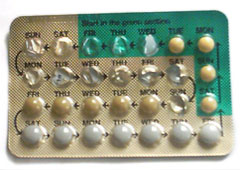Menstrual migraine
Editor-In-Chief: Prab R Tumpati, MD
Obesity, Sleep & Internal medicine
Founder, WikiMD Wellnesspedia &
W8MD medical weight loss NYC and sleep center NYC
| Menstrual migraine | |
|---|---|

| |
| Synonyms | Catamenial migraine |
| Pronounce | N/A |
| Specialty | N/A |
| Symptoms | Headache, nausea, vomiting, sensitivity to light |
| Complications | N/A |
| Onset | Typically occurs around the time of menstruation |
| Duration | 4 to 72 hours |
| Types | N/A |
| Causes | Hormonal changes, particularly fluctuations in estrogen |
| Risks | Family history of migraine, hormonal contraceptive use |
| Diagnosis | Based on clinical history and symptom patterns |
| Differential diagnosis | Tension headache, cluster headache, premenstrual syndrome |
| Prevention | Lifestyle modifications, hormonal therapy, prophylactic medication |
| Treatment | Pain relief medication, triptans, anti-nausea medication |
| Medication | N/A |
| Prognosis | Symptoms can be managed with appropriate treatment |
| Frequency | Affects approximately 60% of women with migraines |
| Deaths | N/A |
Menstrual migraine is a specific type of migraine that is associated with a woman's menstrual cycle. It is a neurovascular disorder that affects approximately 20% of all women who suffer from migraines.
Definition[edit | edit source]
Menstrual migraines are typically defined as migraines that occur in a pattern that is related to the menstrual cycle. They are most likely to occur in the two days leading up to menstruation and the first three days of menstruation.
Symptoms[edit | edit source]
The symptoms of menstrual migraines are similar to those of other types of migraines, but they may be more severe and last longer. Symptoms can include:
- Throbbing or pulsating headache
- Sensitivity to light, sound, and smells
- Nausea and vomiting
- Dizziness
- Fatigue
Causes[edit | edit source]
The exact cause of menstrual migraines is not known, but they are believed to be triggered by the drop in estrogen and progesterone levels that occurs just before menstruation. Other factors that may contribute to menstrual migraines include:
- Changes in sleep patterns
- Dehydration
- Skipping meals
- Stress
Treatment[edit | edit source]
Treatment for menstrual migraines typically involves a combination of lifestyle changes, medication, and sometimes hormonal therapy. Medications used to treat menstrual migraines can include:
- Nonsteroidal anti-inflammatory drugs (NSAIDs)
- Triptans
- Ergotamines
- Beta blockers
- Antidepressants
- Anticonvulsants
Hormonal therapy may involve the use of oral contraceptives, hormone replacement therapy, or other hormonal treatments.
Prevention[edit | edit source]
Preventive measures for menstrual migraines can include maintaining a regular sleep schedule, staying hydrated, eating regular meals, and managing stress. Some women find that taking a magnesium supplement during the second half of their menstrual cycle can help prevent menstrual migraines.
See also[edit | edit source]
Search WikiMD
Ad.Tired of being Overweight? Try W8MD's physician weight loss program.
Semaglutide (Ozempic / Wegovy and Tirzepatide (Mounjaro / Zepbound) available.
Advertise on WikiMD
|
WikiMD's Wellness Encyclopedia |
| Let Food Be Thy Medicine Medicine Thy Food - Hippocrates |
Translate this page: - East Asian
中文,
日本,
한국어,
South Asian
हिन्दी,
தமிழ்,
తెలుగు,
Urdu,
ಕನ್ನಡ,
Southeast Asian
Indonesian,
Vietnamese,
Thai,
မြန်မာဘာသာ,
বাংলা
European
español,
Deutsch,
français,
Greek,
português do Brasil,
polski,
română,
русский,
Nederlands,
norsk,
svenska,
suomi,
Italian
Middle Eastern & African
عربى,
Turkish,
Persian,
Hebrew,
Afrikaans,
isiZulu,
Kiswahili,
Other
Bulgarian,
Hungarian,
Czech,
Swedish,
മലയാളം,
मराठी,
ਪੰਜਾਬੀ,
ગુજરાતી,
Portuguese,
Ukrainian
Medical Disclaimer: WikiMD is not a substitute for professional medical advice. The information on WikiMD is provided as an information resource only, may be incorrect, outdated or misleading, and is not to be used or relied on for any diagnostic or treatment purposes. Please consult your health care provider before making any healthcare decisions or for guidance about a specific medical condition. WikiMD expressly disclaims responsibility, and shall have no liability, for any damages, loss, injury, or liability whatsoever suffered as a result of your reliance on the information contained in this site. By visiting this site you agree to the foregoing terms and conditions, which may from time to time be changed or supplemented by WikiMD. If you do not agree to the foregoing terms and conditions, you should not enter or use this site. See full disclaimer.
Credits:Most images are courtesy of Wikimedia commons, and templates, categories Wikipedia, licensed under CC BY SA or similar.
Contributors: Prab R. Tumpati, MD


